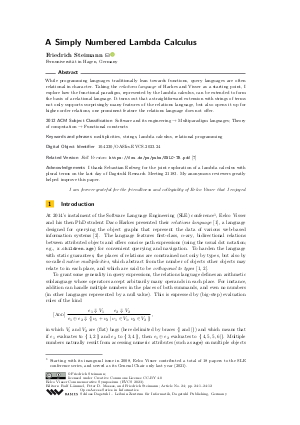A Simply Numbered Lambda Calculus
Author
Friedrich Steimann 
-
Part of:
Volume:
Eelco Visser Commemorative Symposium (EVCS 2023)
Part of: Series: Open Access Series in Informatics (OASIcs)
Part of: Conference: Eelco Visser Commemorative Symposium (EVCS) - License:
 Creative Commons Attribution 4.0 International license
Creative Commons Attribution 4.0 International license
- Publication Date: 2023-03-21
File

PDF
OASIcs.EVCS.2023.24.pdf
- Filesize: 0.6 MB
- 12 pages
Document Identifiers
Related Versions
- Full Version https://feu.de/ps/pubs/SNLC-TR.pdf
Subject Classification
ACM Subject Classification
- Software and its engineering → Multiparadigm languages
- Theory of computation → Functional constructs
Keywords
- multiplicities
- strings
- lambda calculus
- relational programming
Metrics
- Access Statistics
-
Total Accesses (updated on a weekly basis)
0PDF Downloads0Metadata Views
Abstract
While programming languages traditionally lean towards functions, query languages are often relational in character. Taking the relations language of Harkes and Visser as a starting point, I explore how the functional paradigm, represented by the lambda calculus, can be extended to form the basis of a relational language. It turns out that a straightforward extension with strings of terms not only supports surprisingly many features of the relations language, but also opens it up for higher-order relations, one prominent feature the relations language does not offer.
Cite As Get BibTex
Friedrich Steimann. A Simply Numbered Lambda Calculus. In Eelco Visser Commemorative Symposium (EVCS 2023). Open Access Series in Informatics (OASIcs), Volume 109, pp. 24:1-24:12, Schloss Dagstuhl – Leibniz-Zentrum für Informatik (2023)
https://doi.org/10.4230/OASIcs.EVCS.2023.24
BibTex
@InProceedings{steimann:OASIcs.EVCS.2023.24,
author = {Steimann, Friedrich},
title = {{A Simply Numbered Lambda Calculus}},
booktitle = {Eelco Visser Commemorative Symposium (EVCS 2023)},
pages = {24:1--24:12},
series = {Open Access Series in Informatics (OASIcs)},
ISBN = {978-3-95977-267-9},
ISSN = {2190-6807},
year = {2023},
volume = {109},
editor = {L\"{a}mmel, Ralf and Mosses, Peter D. and Steimann, Friedrich},
publisher = {Schloss Dagstuhl -- Leibniz-Zentrum f{\"u}r Informatik},
address = {Dagstuhl, Germany},
URL = {https://drops.dagstuhl.de/entities/document/10.4230/OASIcs.EVCS.2023.24},
URN = {urn:nbn:de:0030-drops-177948},
doi = {10.4230/OASIcs.EVCS.2023.24},
annote = {Keywords: multiplicities, strings, lambda calculus, relational programming}
}
Author Details
Acknowledgements
I thank Sebastian Erdweg for the joint exploration of a lambda calculus with plural terms on the last day of https://www.dagstuhl.de/21183. My anonymous reviewers greatly helped improve this paper. I am forever grateful for the friendliness and collegiality of Eelco Visser that I enjoyed.
References
- Daco Harkes and Eelco Visser. Unifying and generalizing relations in role-based data modeling and navigation. In Benoît Combemale, David J. Pearce, Olivier Barais, and Jurgen J. Vinju, editors, Software Language Engineering - 7th International Conference, SLE 2014, Västerås, Sweden, September 15-16, 2014. Proceedings, volume 8706 of Lecture Notes in Computer Science, pages 241-260. Springer, 2014. URL: https://doi.org/10.1007/978-3-319-11245-9_14.
- Daniël Corstiaan Harkes. Declarative Specification of Information System Data Models and Business Logic. PhD thesis, Delft University of Technology, Netherlands, 2019. URL: https://doi.org/10.4233/uuid:5e9805ca-95d0-451e-a8f0-55decb26c94a.
-
Benjamin C. Pierce. Types and Programming Languages. MIT Press, 2002.

- Harald Søndergaard and Peter Sestoft. Non-determinism in functional languages. Comput. J., 35(5):514-523, 1992. URL: https://doi.org/10.1093/comjnl/35.5.514.
- Friedrich Steimann. None, one, many - What’s the difference, anyhow? In Thomas Ball, Rastislav Bodík, Shriram Krishnamurthi, Benjamin S. Lerner, and Greg Morrisett, editors, 1st Summit on Advances in Programming Languages, SNAPL 2015, May 3-6, 2015, Asilomar, California, USA, volume 32 of LIPIcs, pages 294-308. Schloss Dagstuhl - Leibniz-Zentrum für Informatik, 2015. URL: https://doi.org/10.4230/LIPIcs.SNAPL.2015.294.
- Friedrich Steimann. Containerless plurals: Separating number from type in object-oriented programming. ACM Trans. Program. Lang. Syst., 44(4), September 2022. URL: https://doi.org/10.1145/3527635.
- Friedrich Steimann. A simply numbered lambda calculus with number safety proof. Report, Lehrgebiet Programmiersysteme, Fernuniversität in Hagen, Sept 2022. URL: https://feu.de/ps/pubs/SNLC-TR.pdf.
- Friedrich Steimann and Marius Freitag. The semantics of plurals. In Bernd Fischer, Lola Burgueño, and Walter Cazzola, editors, Proceedings of the 15th ACM SIGPLAN International Conference on Software Language Engineering, SLE 2022, Auckland, New Zealand, December 6-7, 2022, pages 36-54. ACM, 2022. URL: https://doi.org/10.1145/3567512.3567516.
